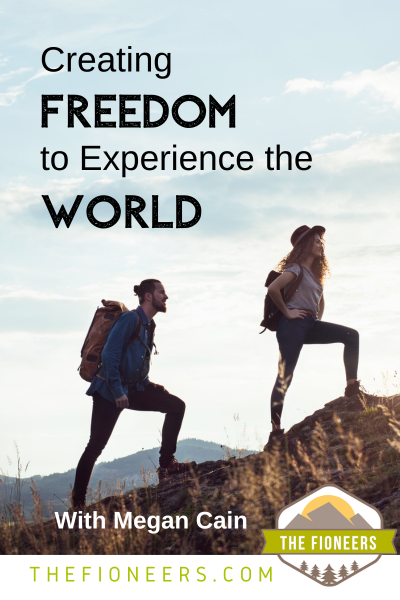
I wrote a blog post in early 2022 about how to travel as much as you want without retiring early. Most people assume that you need to retire early or be self-employed to do this, and I wanted to bust that myth.
I got to learn a bit about Megan’s story when she commented on the post. She shared that she and her husband had been taking 6 weeks off every winter for the last 20 years.
When I heard that I knew I needed to learn more!
- How did they actually do this?
- Were they self-employed the entire time? Or did they have to negotiate the time off with their employers?
- If they were employed in traditional jobs, how did they convince their employers to let them do this every year?
So, I followed up with Megan by email to learn more. We also had the opportunity to meet up with her as we were passing through Portland, Oregon earlier this year on our van trip.
Through emails and conversations, I learned that they are now self-employed. But, earlier in their careers, they needed to negotiate time off with employers. I also learned that Megan’s been able to make even more significant changes in the last few years which has allowed them to take a sabbatical and travel even more.
I knew I needed to get Megan on for a Slow FI interview. I hope you are as inspired by Megan’s story as I am!
1. Tell me a little bit about you.
I grew up in a row home in Philadelphia in a neighborhood surrounded by many members of my large family. My grandparents, great-grandparents, great-aunt, and aunt and uncle were all within a few blocks of walking distance from our house.
After college, I lived in San Francisco for a few years and in Memphis, TN for a short stint. Then, I found my way to an ecovillage in rural Missouri because I was interested in learning more about gardening and intentional communities.
I didn’t know this decision would have a profound impact on my life. The 1 ½ years I lived at the ecovillage were some of the most intense of my life, in a good way. I was exposed to so many of the things that went on to shape my life over the last two decades. I met and fell in love with my husband, learned how to grow food, and experimented with living in small spaces (we lived in a 90 square ft cabin for a year). I went from not knowing how to cook to preparing from scratch, vegan meals for as many as 50 people.
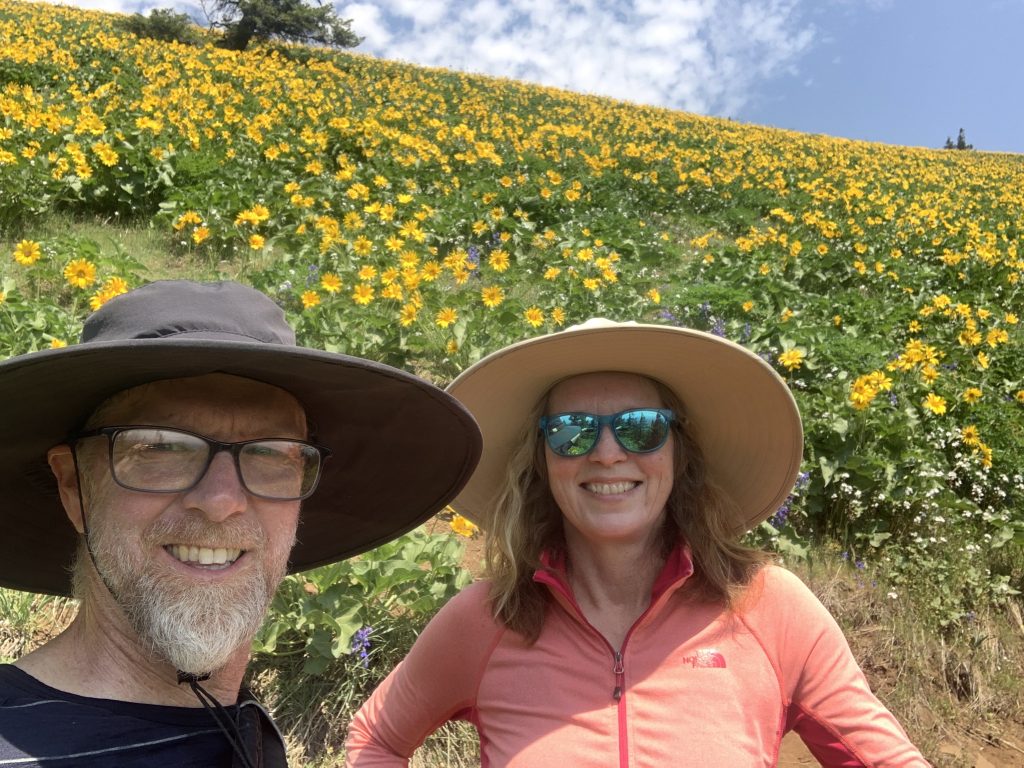
Eventually, my husband and I moved to Madison, WI. We both embarked on new careers, mine as a garden educator and his as an arborist. We bought a house, started businesses, and have built a life and community there for the last 20 years.
2. One thing that piqued my interest when I heard your story was that you’ve taken extended time off every year as world travelers, even when you worked in traditional jobs. Can you tell us more about this?
From a very young age, I was always interested in having a diverse array of experiences. There has never felt like enough time to learn and experience everything I would like to in this life. Over the first few years of our relationship, my husband and I realized that we were on the same page. For both of us, freedom to experience the world mattered way more to both of us than titles or fancy things.
The second year we lived in Madison, we both negotiated with our employers for six weeks off in December and January. We traveled to Costa Rica and Nicaragua and had so much fun that we vowed to make it an annual tradition.
Almost every year since then (2004) we’ve left the frigid Midwest for warmer climates for an average of six weeks. For about half of those years, we were employed by either nonprofits or small businesses, so we had to work it out with our employers to take unpaid time off.
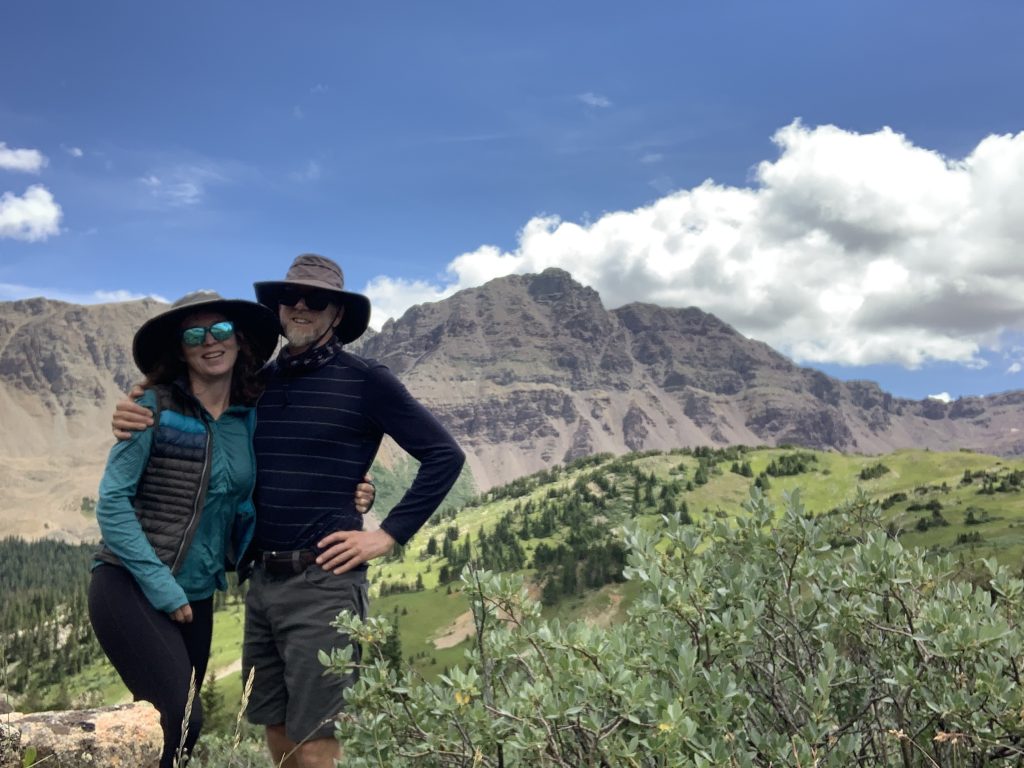
The outdoor and seasonal nature of our jobs made this a bit easier. I worked more hours during the gardening season and less time in the winter, so I was able to negotiate unpaid time off and I made up those hours when I returned. The winter weather would also slow down the pace of work at my husband’s job during the deep winter months, so the owner was open to him taking time off as well.
As each winter arrived, we began to establish the expectation with our employers that we’d be taking off for six weeks. As we both transitioned into being self-employed after about nine years of working for other people, we had more control over our schedules, and my husband had a business partner to rely on to keep things running in his absence.
3. How did taking an extended time off to travel the world each year impact your quality of life?
Over the last twenty years, we’ve spent winter months in Central America, Mexico, Hawaii, California, Oregon, Arizona, Ghana, Chile, New Zealand, and Thailand.
Taking an extended vacation each year has allowed us to connect with one another without all of the busyness of daily life and work. We also got to shake up our routines and escape the long Wisconsin winter.
A six-week vacation is the sweet spot for me! After about week three, I feel so disconnected (in a good way!) from my life at home that it’s hard to remember it. This larger vacation of six weeks has always been a true reset.
We have also been able to travel at a much slower pace than we would if we had only visited those places for a week’s vacation. We’ve studied at language schools, lived with local families, volunteered with nonprofits, worked on farms, and spent many hours on buses, boats, and public transportation. Much of our traveling has featured deep and meaningful experiences. And, at the end of six weeks, we’re often ready to return home and have a new appreciation for where we live.
4. In 2018, you saw a significant transition in your life. What happened? And, what has life been like since then?
To share a bit of context, my husband and I have both also been business owners for many of the last 15 years. My husband owned a tree care company for seven years, I’ve owned an online gardening education business for 10 years, and an operations business for 2 ½.
In 2018, my husband decided to exit the tree care business he started with a partner because the stress was negatively affecting his health and quality of life. I was also feeling burned out around this time.
We decided that this change in my husband’s work life provided the perfect opening to take a year off.
In the fall of 2018, we purged our house of many unwanted items, purchased a teardrop trailer, and listed our house for rent fully furnished (plants included!) on Craigslist.
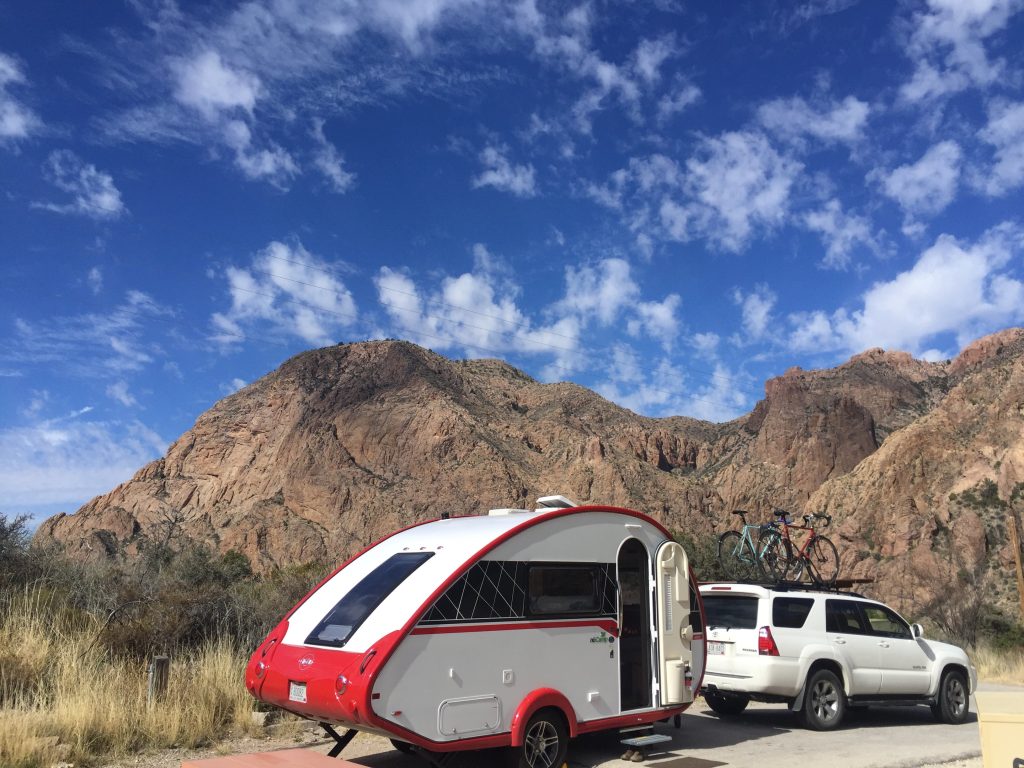
In January, we left for a year on the road, during which we visited 25 national parks, many more national forests and monuments, lots of friends and family, and completed over 150 hikes. At the end of the year, my husband declared it the best year of his life.
We made it back to Madison just in time for Covid to take the world by storm and hunkered down at home through 2020 and into 2021. We did continue our winter trips but kept them domestic – mountain biking in Arkansas and hiking in Tucson.
During our winter trip in early 2022, we made the decision that we were ready to hit the road again, but this time in a different style than living in a tiny trailer. We spent the spring purging more possessions from our lives and rented our house to some coworkers of my husband’s. We left Madison again in June 2022.
This time around, our plan has been to stay in each location we visit longer, primarily focusing on locations where we have family and friends, and for me to work remotely while my husband takes a career break after 18 years as an arborist to focus on what he wants to do next.
5. How have these decisions to travel long-term impacted your quality of life?
During our sabbatical in 2019, I realized what an incredibly positive impact hiking and being outside in nature had on my mental and emotional health. That’s why, since we left the Midwest a year ago, we’ve focused on spending time in places with easy access to hiking trails – Colorado, Tucson, and the Pacific Northwest.
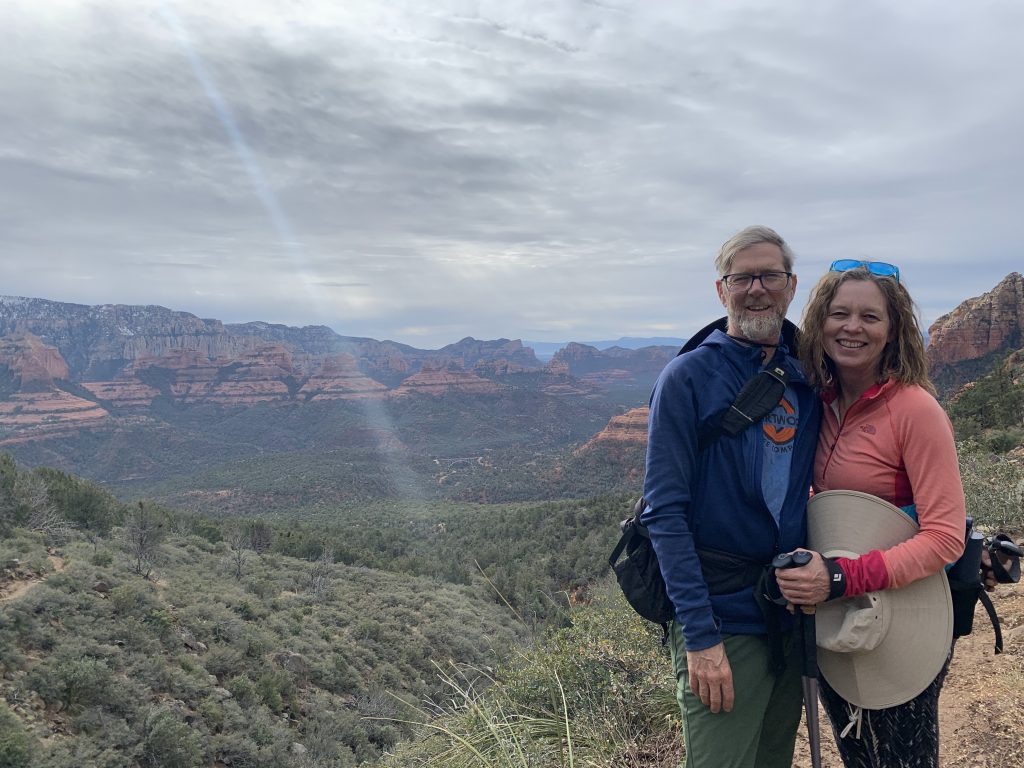
I take Fridays off from working and we’ve named it Friday Funday. Most of the time we go on a long hike, sometimes with friends who also have that day off. This allows me to unwind and center myself after the work week. Most of the other time off we schedule is spent with friends and family, exploring nature, and ideally doing those two things together.
I think, especially at this moment, we’re doing exactly what we want to be doing in life, which gives us a great sense of happiness and contentment.
Things are not perfect and moving locations fairly often can be stressful, but we’ve chosen this life, and that feels empowering.
Many of our life decisions have been focused on providing ourselves with the freedom we desire to live the life we want, which includes not working full time, taking extended time off, and having the money to travel and experience the world.
6. How have these decisions to orient your life around adventure and being a world traveler impacted your financial goals or timelines?
We didn’t know anything about FIRE when we were younger. We didn’t make a lot of money, although we did save for retirement as much as we could, which often wasn’t much.
When my husband had his own tree care company our income increased quite a bit for a few years. Instead of enlarging our life to fit our new financial picture, we chose to make lots of catch-up contributions to our retirement accounts and pay down our mortgage.
I feel that we’re in a much more secure financial situation at this point. We’re not really tracking our FIRE numbers nor are we planning for or talking about early retirement. We’ve decided to focus on sabbaticals, career breaks, and less than full-time work at this point in our lives.
7. What enabled you to focus on adventure and travel?
I think one of the most important decisions we made a long time ago was to always live beneath our means. For our first three years living in Madison, we didn’t own a car and primarily commuted by bike. Eventually, when we wanted to own a car we bought a used one to share. When we bought our first house we purchased an affordable unit in a cohousing community. When we sold that house seven years later and looked for another house, we intentionally stayed in the first-time home buyer price range to keep our monthly mortgage low.
We’ve deliberately created a life that can be funded by only one of us working full-time or both of us working less than full-time. We’ve never cared much about big fancy houses, luxury cars, or other things like that.
Being in our late 40s and early 50s has also changed our perspective on life quite a bit. We’ve each lost a parent in the last 18 months and are watching older friends age and have health challenges.
Being firmly planted in middle age prompted us to ask ourselves, “What do we want the next 10 years to look like?” This is what led us to the decision to leave our home in Wisconsin for a few years and have fun living in different places. Now, we get to pursue the outdoor activities we love while we’re fit and healthy.
Further, I fully acknowledge that being white and from a middle-class background strongly influenced where I find myself today. My parents were both college-educated, expected me to attend college, and helped me pay for some of it. Both my husband’s and my parents gifted us money to purchase a home, which was a direct result of them being able to build up generational wealth by owning their homes. Our parents and siblings are all financially secure and don’t require any financial support from us.
While we did choose to make very mindful decisions about our finances, such as not acquiring large amounts of debt and living beneath our means, a smooth path was paved for us without us having to do anything extraordinary because of our race and class privilege.
8. Were there things in your life you adapted so you could continue to work toward your goals?
Since freedom has always been so important to me, I always wanted to own a business. In 2012 I started The Creative Vegetable Gardener, a gardening education business. It has taken many forms over the last 10 years and, honestly, never quite turned into what I had wanted it to be.
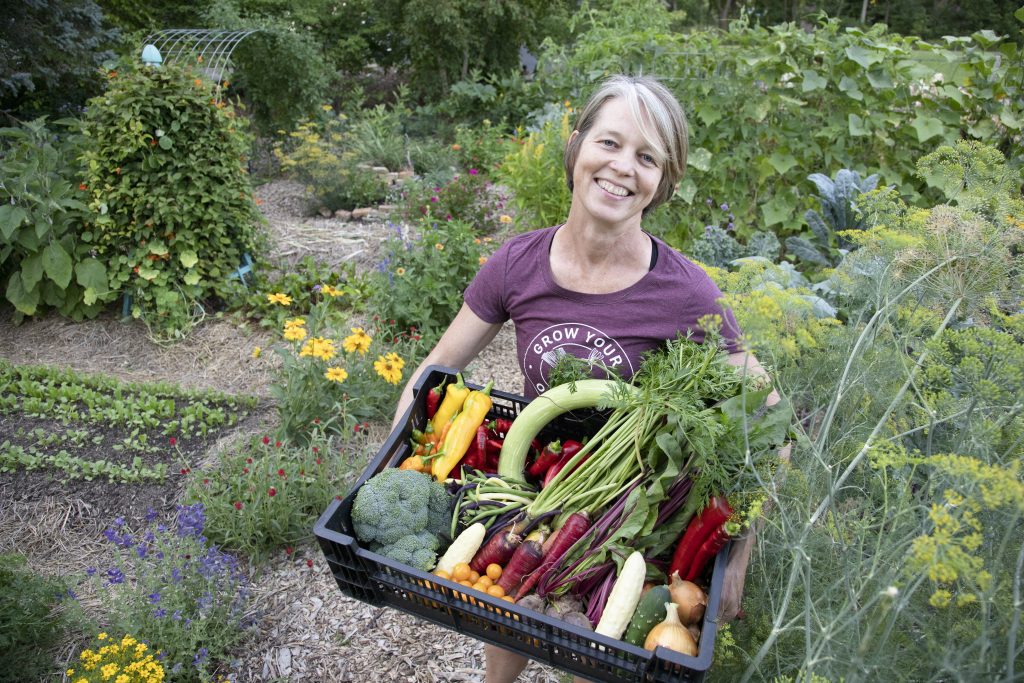
In 2020, after my year-long sabbatical where I didn’t work, I realized I was ready to find something new to do for employment. I toyed with the idea of looking for a more traditional job, but after working with a career coach for 6 months, I decided to start another business. Being self-employed serves me and the way I want to live my life right now.
I launched a project management business in the fall of 2020. My business has gone through some iterations as I’ve honed in on what kind of clients I want to work with and what my zone of genius is. I’m now an Operations Expert who helps entrepreneurs build the back end of their businesses.
Currently, I’m a fractional Director of Operations for two clients and I also offer consulting, strategic planning, and hiring packages. I work virtually, so my office comes with me as we move locations.
I’ve accomplished my goal to build a business that would support us so my husband could take a career break for a while. The Creative Vegetable Gardener now offers a side income to supplement the ops business.
9. How did your pursuit of FI help or hinder your decision to design your life around adventure and experiences?
My brother sent me The Fioneers website a couple of years ago and wrote, “These guys sound like you and Mark.”
While I’ve read about FIRE for many years and was intrigued by it, it felt like it was mostly geared towards engineers and other high earners, which we’re not. Coast FI is far more appealing because I’m more interested in lifestyle design and simple living.
Being motivated by a particular number doesn’t feel healthy for me. Instead, I prefer to focus on the present while saving and investing smartly for the future. Because life is unpredictable, I do want to be prepared for a day when I might need to retire due to health issues or other circumstances, but until then I’ll be creating a life I love.
10. Why and when do you think someone might consider “downshifting?”
One of the most important questions we’ve asked ourselves lately is, “What do we want the next 10 years to look like?” For us, this roughly means the decade of our 50’s. (Yikes, how did that happen?!) When we sat down and discussed it at length, we decided we wanted it to look different than the last 20 years. That means we needed to shake things up.
There are so many scenarios that might lead someone to downshift. I think that if your answer to that question is similar to ours, then it might be time to consider what downshifting could look like for you.
11. What advice do you have for someone considering a similar decision?
My advice is to believe that what you dream of could be possible. If you would have told me in 2004, when we took that first extended winter trip, that we would continue to travel every winter for the next 18 years, I would have laughed. But, somehow, we arranged our lives so that it was possible.
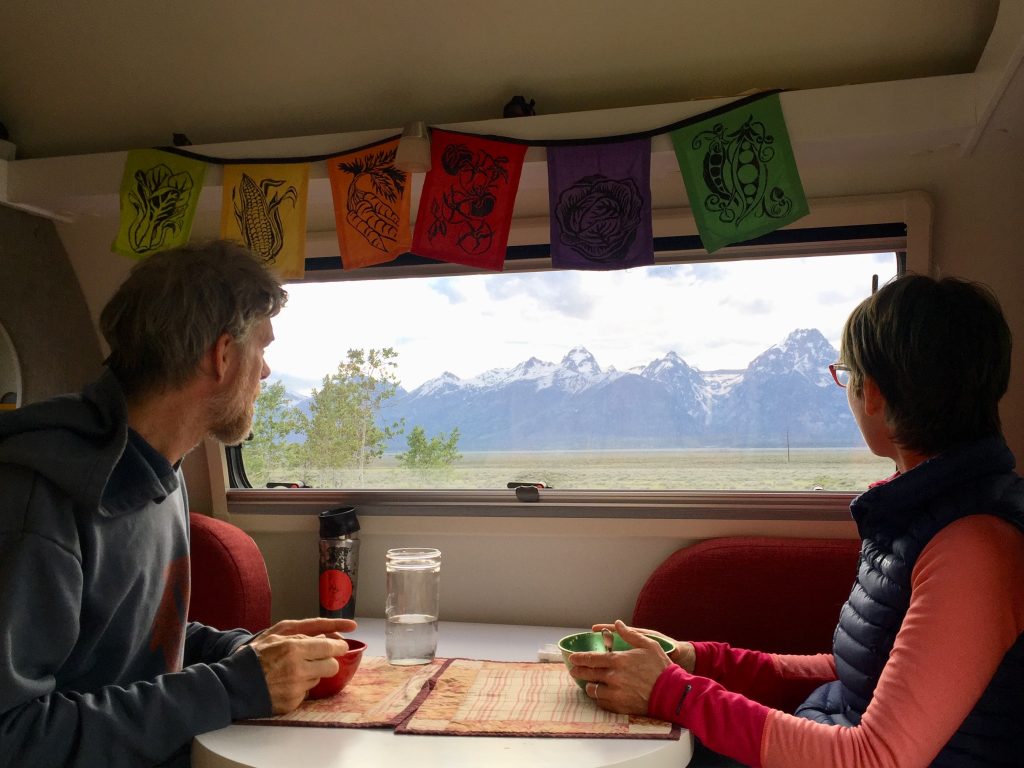
I think that taking incremental steps toward your desired life can be meaningful. We didn’t go from working full-time to taking a year-long trip in a trailer. Similar to Jess and Corey, we rented a trailer on a trip to the Pacific Northwest and loved it. The next spring we bought a trailer and used it for the summer. Then we took a 10-day trip. Eventually, we decided to take a year off and live in it.
Everything is a series of steps. Things don’t have to all happen at once. Practice moving towards the life you wish you had and take it one small, brave move at a time. These steps help you start proving to yourself that you can do it and you become braver and braver, taking bigger and bigger steps over time.
Thank you, Megan, for sharing your story with us!
I absolutely love how Megan and her husband, Mark, have oriented their lives (and by extension, their work) around having the freedom to experience the world (not fancy titles or luxury items).
They were never focused on early retirement, but they’ve always lived below their means.
This has allowed them to focus on life along the way. They started off by taking 6 weeks off each year to travel and, then, figured out a way to do that every year for the last 20 years! In 2019, they each took a year-long sabbatical to travel the USA in a teardrop trailer.
Even though Megan and Mark arguably have had a pretty amazing life so far, they still sat down and asked themselves, “What do we want the next 10 years to look like?”
Even when you are living an unconventional life, it’s still important to re-assess your life and if there’s anything else you want to see change. Then, you can make small, incremental changes to help move you in a new direction.
Megan did exactly this. She now runs her own location-independent business that allows them to live and explore different places around the US. This year they spent the winter in Tucson and the summer in Portland.
I absolutely loved when Megan said, “We’re doing exactly what we want to be doing in life.” She doesn’t need to aim for early retirement because she’s designed a life she doesn’t want to retire from.
If you’d like to connect with Megan, you can find her in the following places:
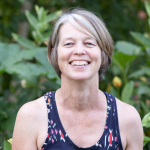

























Loved this! I think my ideal would be to take 3 months off a year.
There is a Chinese saying: A journey of a thousand miles begins with a single step. I think it fits here perfectly. Great article!
I agree! Thank you for sharing!